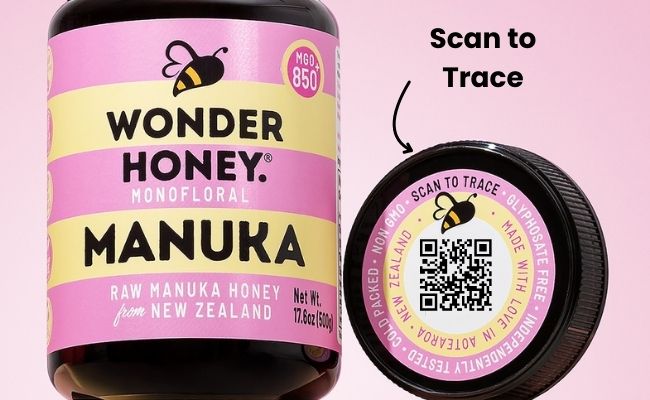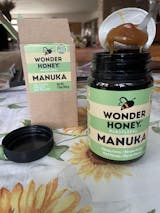What is a Prebiotic?
Prebiotics are defined as non-digestible food components that selectively stimulate the growth and activity of beneficial microorganisms in the gut. They serve as nourishment for probiotics, the good bacteria that play a crucial role in maintaining a healthy gut microbiome. By enhancing the growth of these beneficial bacteria, prebiotics contribute to improved digestion, enhanced immune function, and overall well-being (Gibson et al., 2004).
How Manuka Honey Supports Gut Microbiota
1. Rich in Oligosaccharides
Manuka honey is rich in oligosaccharides, which are complex carbohydrates that resist digestion in the upper gastrointestinal tract. These oligosaccharides reach the lower intestines, where they can stimulate the growth of beneficial gut bacteria (Mandal et al., 2016). The presence of these non-digestible components is essential for promoting a healthy gut environment, as they provide a food source for probiotics.
One Manuka study showed the most abundant oligosaccharides found was erlose (179.5 mg/g) followed by panose (24.3 mg/g) and maltotriose (22.3 mg/g). Trace amounts of maltose (9.3 mg/g), nigerose (9.7 mg/g), and kojibiose (4.0 mg/g) were also identified
2. Promotes Beneficial Bacteria
Research indicates that the consumption of Manuka honey can lead to an increase in populations of beneficial bacteria such as bifidobacteria and lactobacilli. These bacteria are crucial for maintaining a balanced gut microbiome and preventing dysbiosis, a condition characterized by an imbalance of gut bacteria that can lead to various health issues, including inflammatory bowel disease and obesity (Roberfroid, 2007). By fostering the growth of these beneficial bacteria, Manuka honey helps support digestive health and overall well-being.
3. Anti-inflammatory Properties
Manuka honey is well-known for its anti-inflammatory effects, which can help reduce inflammation in the gut. Chronic inflammation is often linked to various gastrointestinal disorders, and a healthy gut environment is essential for the growth of beneficial bacteria (Kumar et al., 2016). The anti-inflammatory properties of Manuka honey can create a more favourable environment for probiotics to thrive, thereby enhancing gut health.
4. Antibacterial Effects
While Manuka honey possesses strong antibacterial properties that can combat harmful bacteria, it does not adversely affect the beneficial populations of the gut. This selective action is crucial for maintaining a healthy balance in the gut microbiota. Studies have shown that Manuka honey can inhibit the growth of pathogenic bacteria without disrupting the beneficial bacteria, making it a unique and effective option for promoting gut health (Mandal et al., 2016).
5. Potential for Gut Remediation
Emerging research suggests that Manuka honey may have the potential to remediate the gut microbiome in states of dysbiosis, such as during infections or when the bowels are inflamed. The combination of its prebiotic, anti-inflammatory, and antibacterial properties positions Manuka honey as a promising candidate for dietary interventions aimed at restoring gut health (Schell et al., 2022).
Incorporating Manuka honey into your diet can be a delicious and effective way to support your gut health. Its prebiotic properties, combined with its ability to promote beneficial bacteria and reduce inflammation, make it a valuable addition to a balanced diet. Whether enjoyed in tea, drizzled over yogurt, or taken by the spoonful, Manuka honey offers a natural approach to enhancing gut microbiota and overall health. As research continues to uncover the full extent of its benefits, Manuka honey stands out as a functional food that can contribute to a healthier lifestyle.
References
- Gibson, G. R., Probert, H. M., Van Loo, J., Rastall, R. A., & Roberfroid, M. B. (2004). Dietary modulation of the human colonic microbiota: updating the concept of prebiotics. Nutrition Research Reviews , 17(2), 259-275. Link
- Kumar, S., & Singh, R. (2016). Manuka honey: A natural remedy for gastrointestinal disorders. Journal of Medicinal Food , 19(1), 1-7.
- Mandal, M., & Mandal, S. (2016). Honey: Its medicinal property and antibacterial activity. Asian Pacific Journal of Tropical Biomedicine , 6(3), 253-259. Link
- Roberfroid, M. (2007). Prebiotics: The concept revisited. Nutrition , 23(5), 525-528. Link
- Schell, T. C., et al. (2022). Prebiotic Honey and Gut Health. Frontiers in Nutrition , 9, 957932. Link






